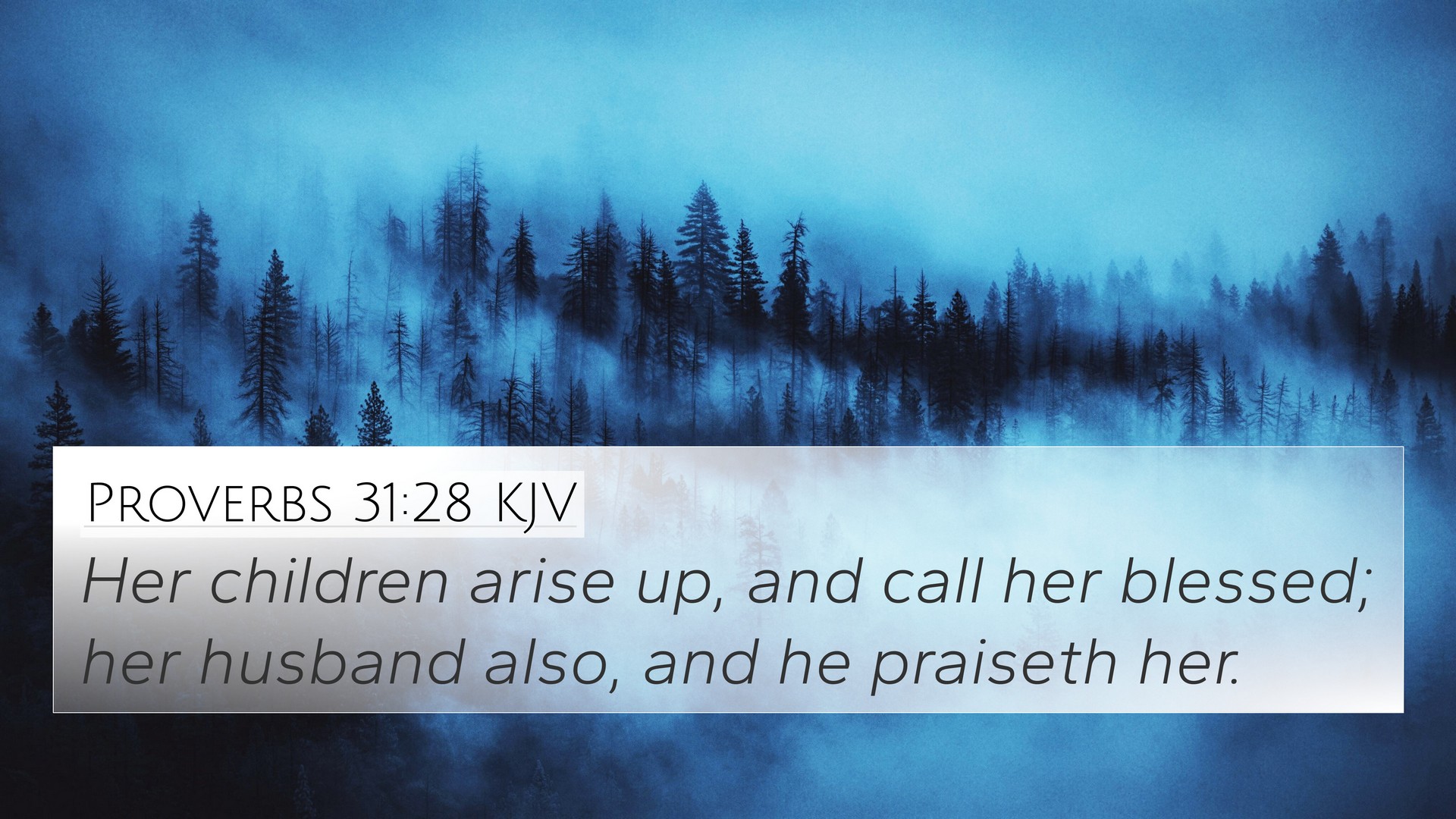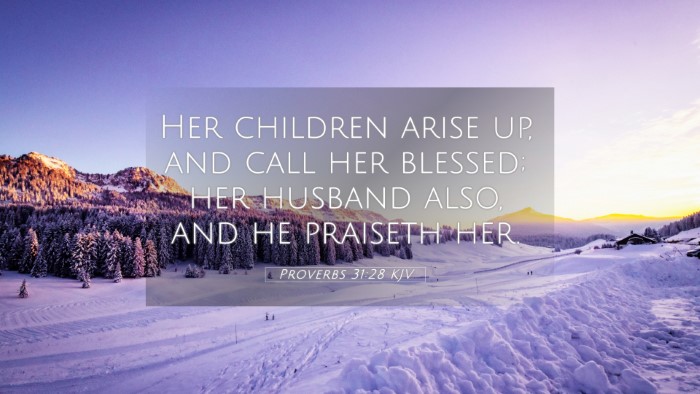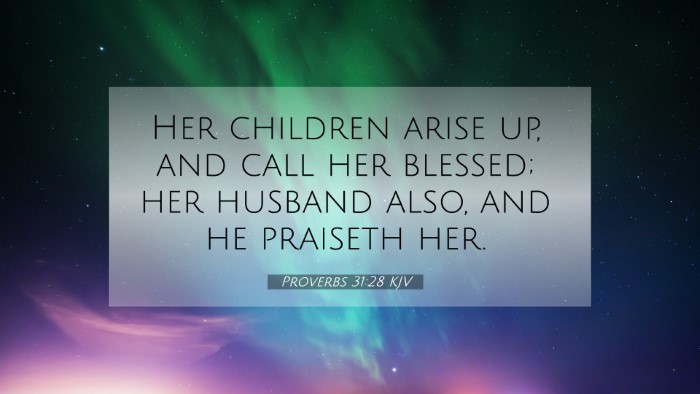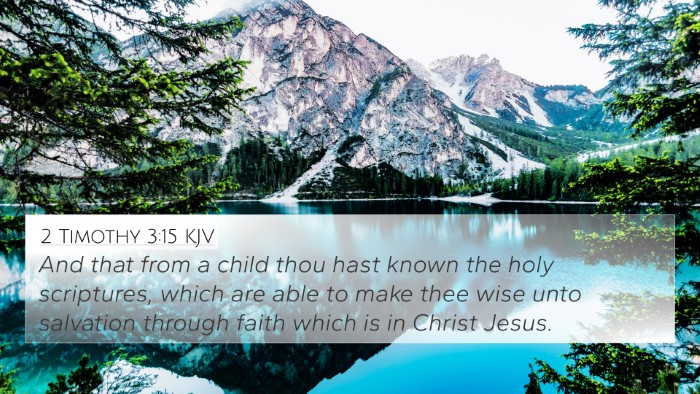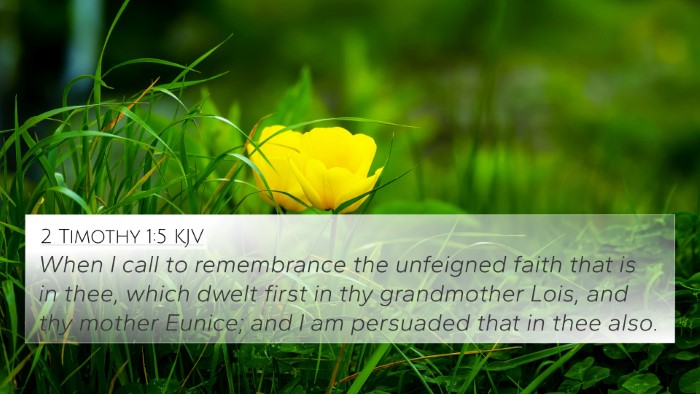Understanding Proverbs 31:28
Proverbs 31:28 states: "Her children rise up and call her blessed; her husband also, and he praises her."
This verse encapsulates the esteem and admiration found within a loving family structure, highlighting the vital role of a mother and wife.
Summary of Insights from Public Domain Commentaries
The commentary from Matthew Henry emphasizes the honor and gratitude that children and a husband should extend towards a virtuous woman. He notes that this acknowledgment reflects the wisdom and strength of a mother’s character, which earns not just respect, but deep appreciation within the family context.
Albert Barnes expands on this by stating that the blessings referred to are often the result of the woman's diligent care and moral guidance in the home. He articulates that a family’s praise can serve as a high mark of commendation for her influence and virtue, acknowledging her as both a nurturer and a guide.
Meanwhile, Adam Clarke provides an interpretation that highlights the cultural recognition associated with motherhood. He notes that the act of calling her blessed is not merely verbal; the implications suggest a lifestyle of gratitude and respect cultivated by her character.
Thematic Connections
This verse intricately connects to broader biblical themes concerning family, motherhood, and virtue. Here are several critical cross-references that complement the message of Proverbs 31:28:
- Proverbs 31:10 - "A wife of noble character who can find? She is worth far more than rubies." This verse introduces the commendable characteristics of the virtuous woman.
- Genesis 2:18 - "The Lord God said, 'It is not good for the man to be alone. I will make a helper suitable for him.'" Here, the significance of companionship and partnership in marriage is established.
- Titus 2:4-5 - "Then they can urge the younger women to love their husbands and children, to be self-controlled and pure, to be busy at home, to be kind, and to be subject to their husbands, so that no one will malign the word of God." This passage speaks to the responsibilities of women within familial roles.
- 1 Timothy 5:10 - "And well attested for good works, if she has brought up children, shown hospitality, washed the feet of the saints, helped the afflicted, and devoted herself to every good work." This reinforces the honor that comes from being a caring and positive influence.
- Psalm 127:3 - "Sons are a heritage from the Lord, children a reward from him." This verse emphasizes the blessed nature of children as gifts from God.
- Luke 1:48 - “For he has been mindful of the humble state of his servant. From now on all generations will call me blessed.” This speaks to the recognition of blessedness across generations.
- Proverbs 18:22 - “He who finds a wife finds what is good and receives favor from the Lord.” This further validates the honor and goodness that comes with a virtuous partner in a marriage.
Practical Application and Interpretation
In practical terms, Proverbs 31:28 reminds us of the importance of recognizing and appreciating the hard work and moral strength of women in the family setting. Biblical texts often illustrate themes of familial respect, love, and godly influence. By rising up to call a mother blessed, children and husbands reflect their acknowledgement of her invaluable contributions.
Utilizing Cross-Referencing for Deeper Understanding
Using cross-references can be an effective method for Bible study. Here are some tools and techniques to consider when engaging with scriptures:
- Bible Concordance - A directory of biblical words, allowing readers to find verses based on specific terms.
- Bible Cross-Reference Guide - A compilation of verses that help facilitate deeper understanding of connections across different texts.
- Comprehensive Bible Cross-Reference Materials - Resources that provide extensive listings of related passages for profound scriptural study.
Conclusion
Proverbs 31:28 serves as a profound reminder of the mutual respect and admiration between family members, particularly the appreciation of mothers and wives. By engaging with related biblical texts through cross-referencing, one can build a more comprehensive understanding of family dynamics as conveyed in the Scriptures.
